African legend: Tirunesh Dibaba
The multi-medalled Ethiopian running great talks about some of the races that have defined her historic career
Given the athletic pedigree that runs in her family (no pun intended), it’s perhaps not surprising that Tirunesh Dibaba became a professional runner. Her cousin, Derartu Tulu, was the first Black African woman to win an Olympic gold when she secured victory in the 10,000 metres at the 1992 games (she won the event again at the 2000 Olympics), and her sisters, Ejegayehu and Genzebe (older and younger than Tirunesh, respectively), are also Olympic and World Championship medallists across a range of distances.
But although Tirunesh may have seemed destined to become an athlete, few could have predicted just how incredible her running career would be: youngest female world champion in athletics history, youngest Ethiopian Olympics medallist, first female athlete to win both the 5,000 and 10,000 metres at the Olympics, six Olympic medals, five World Championship victories, a batch of World Records set during her career… The list goes on.
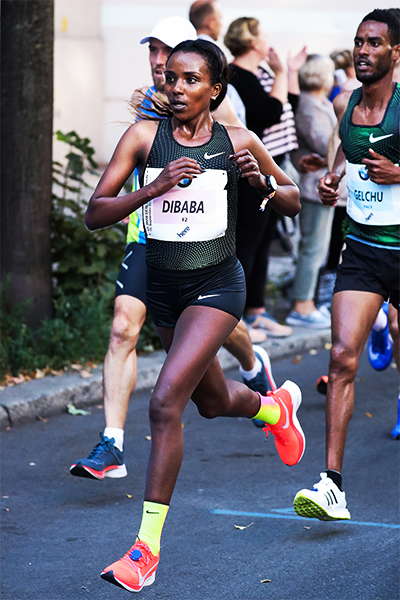
Hitting the streets: Tirunesh at the 2018 Berlin Marathon / Image: Victah Sailer/PhotoRun.NET
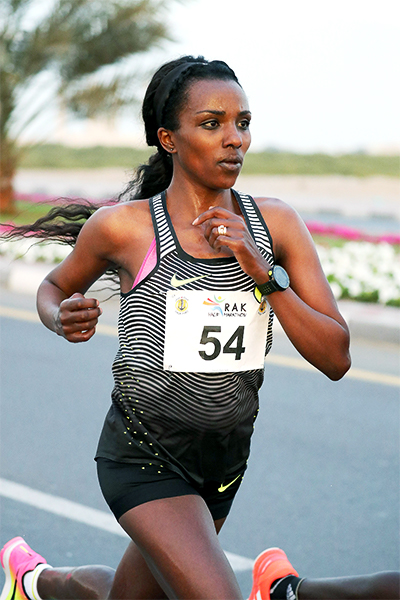
Keeping up the pace at the famously fast Ras Al Khaimah Half Marathon in 2017 / Image: Victah Sailer/PhotoRun.NET
Tirunesh’s path to athletics greatness began in Bekoji, a town near the centre of Ethiopia that has spawned numerous world-class long-distance runners, including three-time Olympic gold medallist Kenenisa Bekele and Tirunesh’s cousin, Derartu, amongst others.
“Bekoji is a small town at a high altitude. It’s a bit chilly!” says Tirunesh. “We have a good coach, who has helped us very much with our training. The coach’s wisdom and the technical activities we do in Bekoji have helped it to produce so many good athletes.”
Tirunesh began running when she was in school, where it became clear she was a talented athlete. It wasn’t long before she had the chance to start entering major cross-country races, including her international debut in 2001, aged 15, where she finished fifth. This was to be her entry point into professional running, and although the majority of her elite career would be track-focused, cross-country was a skill she retained, securing five gold medals at various world championship races between 2003-2008.
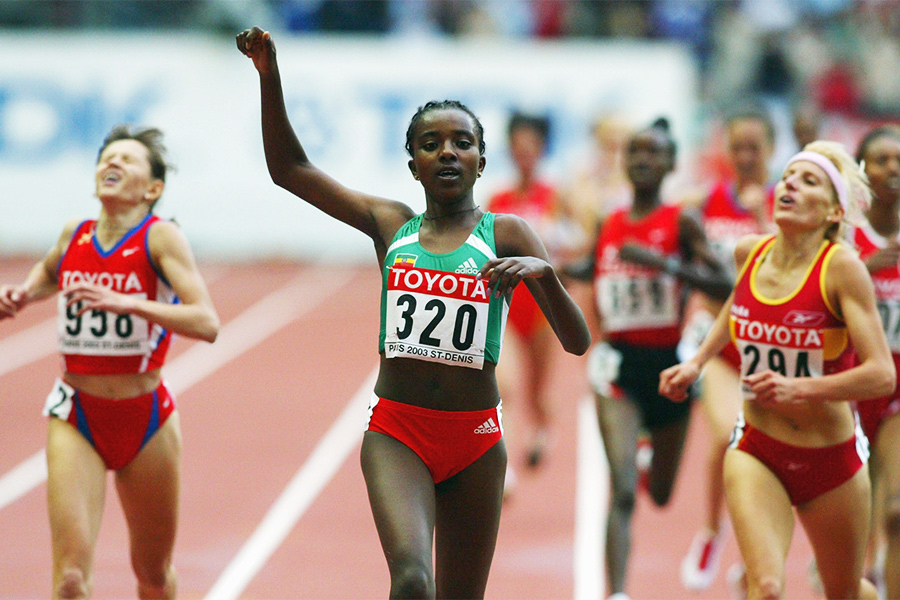
Tirunesh celebrates winning the 5,000 metres at the World Athletics Championships in Paris, 2003 / Image: Getty Images

What put her even more firmly into the global spotlight, however, was a race at the 2003 World Athletics Championships in Paris. Aged just 18, Tirunesh thundered into first place in the final of the 5,000 metres, winning gold and becoming the youngest female World Champion in athletics history in the process.
“It was one of the happiest moments of my life,” she says. “I made it through the heats and then I was in the finals, and when I won, I couldn’t believe it. I thought there was maybe still one more round left to run! I didn’t expect to win, because there were big athletes participating from all over the world. It felt like I was dreaming.”
Just few months later, Tirunesh claimed victory in the third edition of the Great Ethiopian Run, an annual 10km competition co-founded by Ethiopian running icon Haile Gebrselassie. The event has become Africa’s biggest road race, and its winners – often upcoming athletes on the Ethiopian running scene – are usually found perched atop podiums in various global stadiums in the years following the run.
This was also true for Tirunesh, for whom Paris was to be just one of many world-beating victories. Highlights of a glittering career include five World Championship golds and six Olympic medals, two of which were achieved in a historical double in Beijing in 2008, when she became the first woman to win gold in both the 5,000 and 10,000 metres.
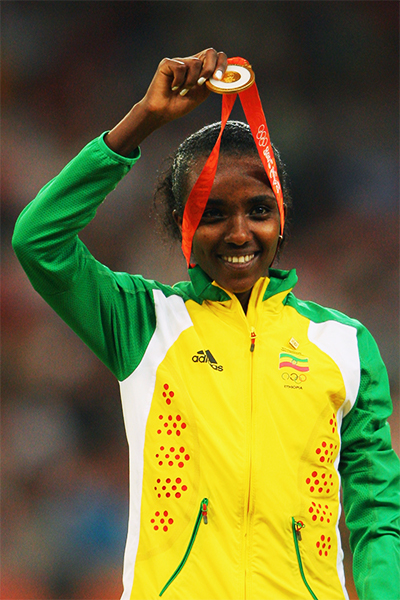
Tirunesh raises her Olympic gold medal for the 5,000 metres in Beijing, 2008 / Image: Getty Images
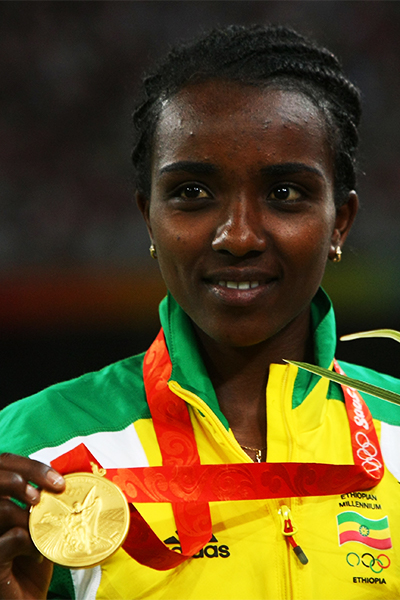
Make mine a double: Tirunesh claims Olympic gold in the 10,000 metres to accompany her 5,000 metres victory / Image: Getty Images
More than doubling or quadrupling those distances didn’t prove any kind of obstacle, proven by her professional half-marathon debut in 2012 at the UK’s much-loved Great North Run. She won. A few years later saw Tirunesh launch into world marathoning, finishing in the top three at various editions of the globally recognised races in London and Berlin, as well as winning the similarly esteemed Chicago Marathon in 2017.
Despite this – and perhaps because of her landmark Paris victory – the 5,000 metres retains a special place in her heart. “It’s my favourite distance to run,” she says. “There’s always a lot of competition, so whenever I win a race at that distance, I’m really thrilled.”
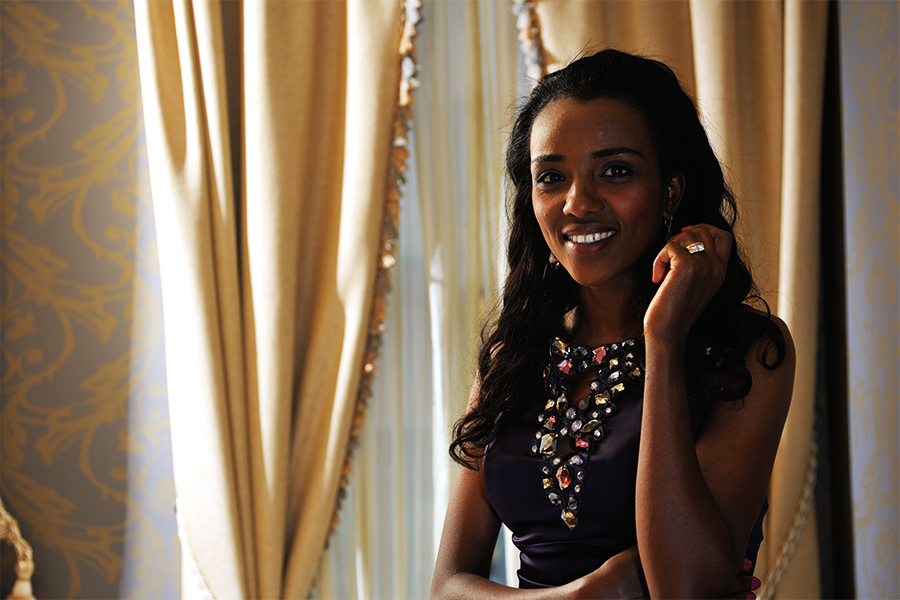
Away from the track: Tirunesh in a rare stationary moment / Image: Peter Baker Studios

Outside of running, Tirunesh says she gets most enjoyment from spending time with her family. But her love for running is still as strong as ever. “The passion hasn’t decreased,” she confirms. “Running is in my blood and I still get the same feeling whenever I go out for training that I always have done. It’s always there.”
That doesn’t look like it’ll be changing anytime soon for Tirunesh, whose place is the history books is firmly assured.